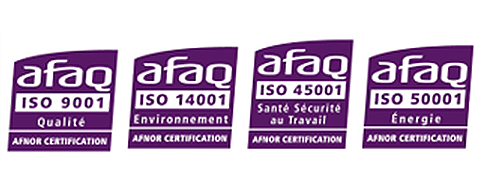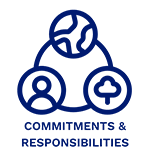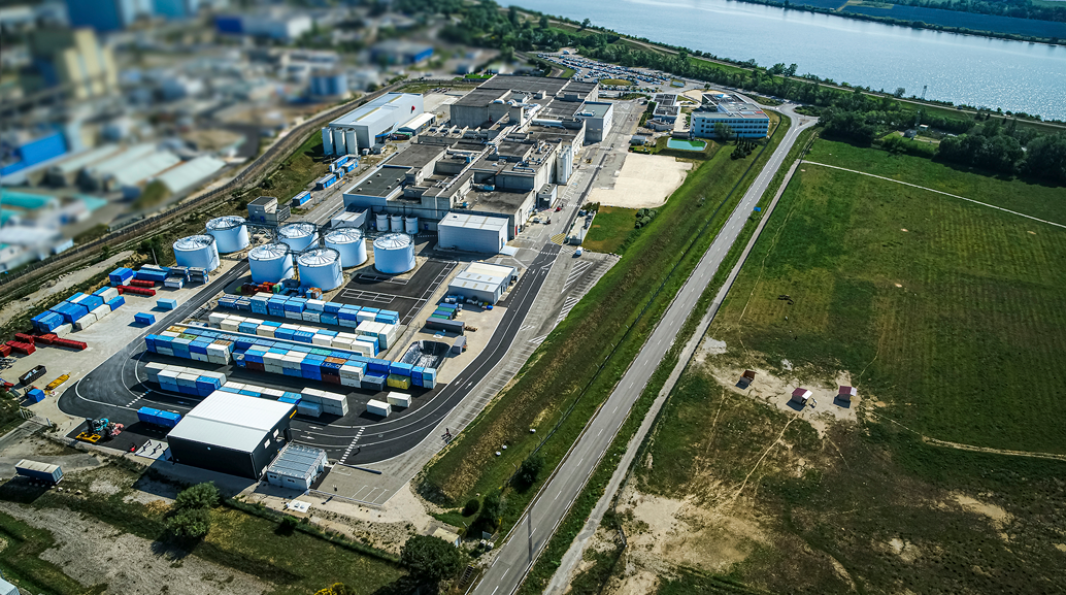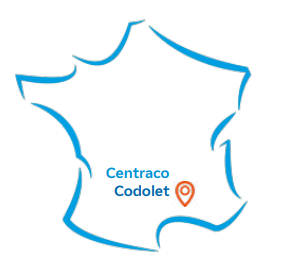A committed and responsible company
Ensuring long-term progress in safety, environmental, security and radiological management, combined with technical and economic performance, is a major challenge for Cyclife France. Through its activities at the Centraco site and at the producer sites, Cyclife France reduces the volume of radioactive waste, packages it and recycles it where possible in order to limit the amount of radioactive waste sent to final disposal.
Safety is a priority for all Cyclife France employees. They work daily to ensure compliance with nuclear safety and operational requirements, whether in the incineration and melting plants at the Centraco site or at the producers' sites with their mobile units.
Cyclife France's fourfold commitment

As a responsible industrial company, Cyclife France has been committed to environmental management since 2003. This is reflected in its ISO 14001 certification, which recognises the company's commitment to continuous progress in environmental protection. This international standard certifies the existence and effectiveness of the environmental procedures applied by the company.
Cyclife France also obtained ISO 9001 certification in 2005, confirming its determination to make continuous improvement of its performance a key element of its management approach. In 2006, Cyclife France has obtained OHSAS 18001 certification, a further commitment to health and safety. In 2021, Cyclife France has transformed the OHSAS 18001 into the ISO 45001 standard.
In 2023, Cyclife France has made a new commitment, this time to energy management at the Centraco site, by obtaining ISO 50001 certification.
Cyclife France actions

Actions for environment
Cyclife France optimises the use of the natural resources and raw materials necessary for its operations, in particular by reducing its consumption of water, electricity and fuel oil and by reducing its production of waste.
Cyclife France is also equipped to monitor the gaseous and liquid emissions of its facilities, making it one of the best French companies in this field. Controlling emissions into the environment means strictly complying with the emission permits issued by the authorities.
All these efforts contribute to limiting the impact of Cyclife France's activities on the population, fauna, flora and the environment as a whole.
Actions for safety
Progress actions are based on the identification of risk situations and the analysis of near misses in order to implement the resulting preventive measures.
Monthly awareness-raising sessions, supplemented by one-off actions, help to maintain employees' vigilance.
Actions for energy efficiency
For several years now, Cyclife France has been engaged in a fruitful energy improvement programme. Between 2019 and 2022, electricity and fuel consumption have been reduced by an average of 10%.
Here are some of the measures already implemented or ongoing:
- Construction of a new 2,700 m2 office building to RT2012 standards with a 20% reduction in energy consumption.
- Refurbishment of the cooling system at the Centraco plant
- Replacement of neon lighting with LED lighting
- Management of heating and air conditioning consumption
- Improvement of process and ventilation equipment
- Training operators to operate the incineration furnace
- Installation of 2,000m2 of shaded photovoltaic panels on the Centraco car park
Corporate responsibility
In terms of corporate social responsibility, Cyclife France adheres to the Ethics & Compliance Charter of the EDF Group, of which Cyclife is a 100% subsidiary.
Cyclife France is also committed to gender equality and publishes every year its score on the Gender Equality Index.
Centraco, a respectful plant

Centraco's facility is designed to minimise releases to the environment
As with any basic nuclear installation (INB), the plant meets strict and specific standards and controls imposed by the Nuclear Safety Authority (ASN).
Two containment barriers have been installed between the radioactive material and the environment to minimise releases in the event of an incident.
The design provisions ensure that, even in the event of failure of the two barriers, the impact of the radioactivity released on the population would always remain below 1 milliSievert (annual exposure limit for people living near nuclear installations).
Low level waste closely monitored
The waste treated by Cyclife France is constantly monitored from collection to final disposal.
Specific criteria relating to radioactivity, physical and chemical composition and the method of conditioning are conditions for the acceptance of the waste.
Releases from the Centraco site are regulated by a permit issued by the Ministries of Industry, Environment and Health.
The performance of radiological filtration and chemical cleaning equipment ensures compliance with very strict limits. To verify the expected level of efficiency, instruments continuously monitor the operation of the filters and analyse the releases to the stack.
The only liquid effluent released from the Centraco site comes from the fumes from the incineration unit. The level of radioactivity is very low: it is comparable to the level of natural radioactivity. The liquids from this process are sent to the Marcoule liquid effluent treatment plant before being discharged into the Rhône River.
Cyclife France is responsible for its emissions, but also for environmental monitoring. This is carried out by the competent services of the CEA Marcoule, which are able to detect any increase in radioactivity in the vicinity of the site.
Cyclife France, a committed local company

Cyclife France is located on the Centraco industrial site in Codolet in the South of France, on the boundary between the Ardèche, Drôme and Vaucluse regions, close to the Marcoule platform.
Like any nuclear site operator, Cyclife France participates in the Marcoule-Gard Local Information Commission (CLI) with all the nuclear operators on the platform.
As a local economic actor, Cyclife France has contributed to the volume of local and regional activities in 2022 through local purchases from its suppliers amounting to 34.4 million euros, distributed in Occitanie but also in Provence-Alpes-Côte d'Azur and Auvergne-Rhône-Alpes, 2 neighbouring regions. Local taxes (nuclear tax, territorial economic contribution, property tax, etc.) totalled 1.8 million euros, which were used to finance local investments.
